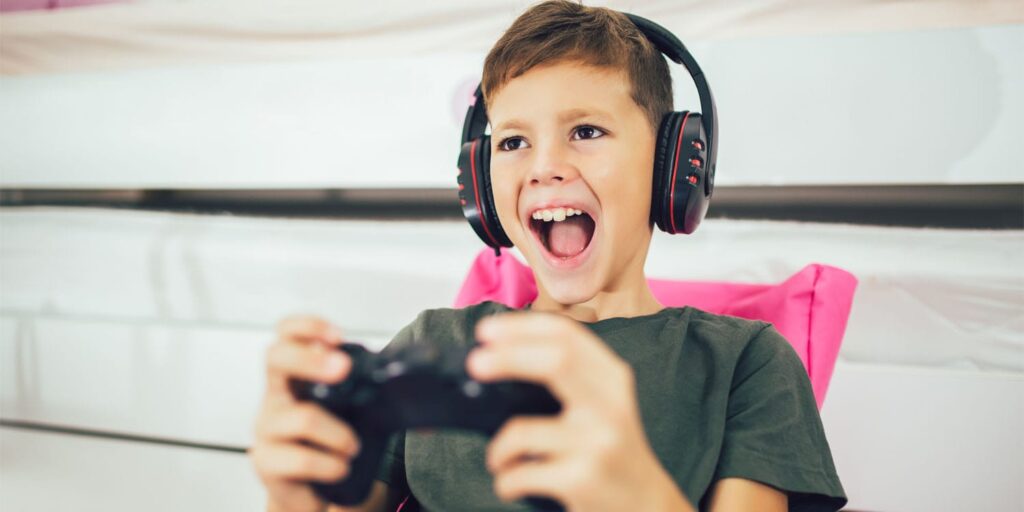A study of preschoolers at risk for developmental dyslexia found that playing “Space Invaders Extreme 2” for 45 minutes a day, four times a week for 1.5 months improved their ability to hear and manipulate the individual sounds in words (phonological awareness). This improvement was greater than that achieved by a group that received speech therapy and played other non-action games. The study Npj Learning Science.
Dyslexia is a learning disability characterized by difficulties with accurate and fluent word recognition, spelling, and decoding. These difficulties are unexpected given the child's other cognitive abilities and the fact that they are being taught to read and write. Dyslexia is a neurological disorder with a genetic component, so it often runs in families.
Dyslexia is most often identified during the early years of primary school. It is at this time that children begin to receive formal reading and writing instruction, and the reading and writing difficulties experienced by children with dyslexia become apparent. Dyslexia cannot be prevented, but early intervention and targeted training can significantly reduce the risk. Researchers are therefore very interested in identifying children at risk of dyslexia as early as possible and developing effective training methods to improve their reading skills.
Study author Sara Bertoni and her colleagues point out that play is essential for child development. Play creates a rich environment that supports cognitive development and learning by activating specific combinations of large-scale neural networks in the brain. In this context, action video games may be particularly useful because children are motivated to play and the cognitive demands they pose “put the brain in a more plastic state.”
Researchers conducted a study to test whether deficits in cognitive skills believed to be necessary for reading development could be overcome by children with these deficits by playing action video games. The researchers looked at three components that predict reading development and that are known to be deficient in children with dyslexia: phonological awareness, phonological working memory, and rapid naming.
Phonological awareness is the ability to recognize and manipulate the individual sounds (phonemes) in spoken language, phonological working memory refers to the ability to temporarily hold and process sound information, and rapid naming refers to the ability to quickly name a random sequence of letters, numbers, colors, or objects.
The study participants were 120 preschool children around 5-6 years old, recruited at the IRCCS “Eugenio Medea” Scientific Institute (Bosicio Parini, Italy). The researchers had them complete a series of reading-related tasks and found that 79 of them could be classified as at risk for dyslexia.
The researchers divided the children at risk for dyslexia into four groups. The first group would play the action video game Space Invaders Extreme 2 for 45 minutes, four times a week, for the next 1.5 months. The second group would play a series of mini-games over the same period and with the same intensity. The third group would receive phonological training (the usual training for dyslexia) from a speech therapist. This training consisted of 21 45-minute individual sessions over 3.7 months. The fourth group was a wait-list group (no treatment). The children classified as not at risk did not receive any treatment.
Before and after treatment, or at two specified time points (for the non-treatment group), participants underwent neuropsychological assessments measuring phonological awareness, phonological working memory, and rapid naming.
Results showed that the group who played Space Invaders Xtreme 2 showed significantly greater improvements in phonological awareness compared to all other groups. This was true both when considering the groups individually and when combining them with the other two treatment groups. A follow-up assessment conducted six months later showed that the changes observed in the Space Invaders Xtreme 2 group were sustained.
“Our results suggest that AVG [action video games, Space Invaders 2 in this case] It has large, long-lasting, and clinically relevant effects on the regulation of phonological representations in prereaders at risk for DD. [developmental dyslexia]”By accelerating the sampling rate of sensory evidence and reducing delays in attention shifts,” the researchers concluded.
“These findings suggest that AVG may be useful in preventing several neurodevelopmental disorders characterized by early dysfunction in attention allocation, including dyslexia, attention deficit hyperactivity disorder, developmental coordination disorder, and autism spectrum disorder, as well as multisensory processing disorders in typically developing children.”
This study highlights the potential impact of action video games on the development of cognitive skills necessary for reading acquisition. However, it should be noted that this study only used one action video game and targeted children of a very specific age. It is unclear which elements of Space Invaders 2 Extreme drove the observed effects. It is also unclear whether these effects would be achieved in older or younger children than those studied.
The paper, “Action video games normalize phonological awareness in prereading children at risk for developmental dyslexia,” was written by Sara Bertoni, Chiara Andreola, Sara Mascheretti, Sandro Franceschini, Milena Ruffino, Vittoria Trezzi, Massimo Molteni, Maria Enrica Sali, Antonio Salandi, Ombretta Gaggi, Claudio Palazzi, Simone Gori, and Andrea Facoett.


